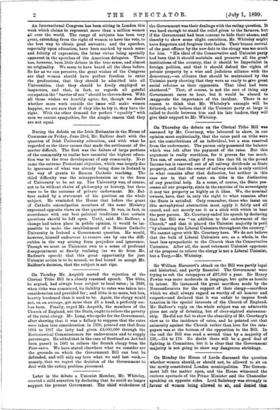Sir William Harcourt's attack on the Bill was partly legal
and historical, and partly financial. The Government were trying to rob the ratepayers of £87,000 a year. Sir Henry Fowler was more moderate in language, but quite as hostile in intent. He instanced the great sacrifices made by the Nonconformists for the support of their clergy—sacrifices which we shall always regard as worthy of all honour and respect—and declared that it was unfair to impose fresh taxation in the special interests of the Church of England. Mr. Balfour's reply on the whole subject was an admirable piece not only of debating, but of clear-sighted statesman- ship. He did not fail to show the absurdity of Mr. Courtney's view as to the incidence of rates, and he pointed out that animosity against the Church rather than love for the rate- payers was at the bottom of the opposition to the Bill. In the end the Bill was read a second time by a majority of 138,-314 to 176. No doubt there will be a good deal of fighting in Committee, but it is clear that the Government majority is not going to show any dangerous shrinkage.















































 Previous page
Previous page